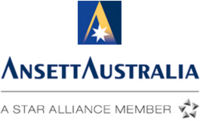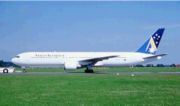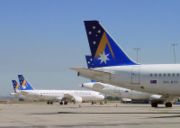澳大利亞安捷航空公司
出自 MBA智库百科(https://wiki.mbalib.com/)
澳大利亞安捷航空公司官方網站網址:http://www.ansett.com.au/
目錄 |
安捷航空(Ansett Australia 或 Ansett)是澳大利亞重要的國內和國際航空公司。2002年公司因為財政問題而破產,後來它的大多數資產用於償還了債務。這家航空公司共經營66年。
讓澳大利亞人備感傷心的是,創造出66載傲視群雄輝煌歷史的澳大利亞第二大航空公司 ――澳大利亞安捷航空公司(Ansett Australia簡寫為“AN”),難以抵禦接二連三“停飛事件”的重創,無可奈何地於2002年3月5日宣告倒閉破產,一步三回頭地退出了澳大利亞航空業的競爭舞臺,含淚忍悲地結束了自己那遨游長空振翅飛的“藍天生涯”。
為何曾令澳大利亞人無比自豪的“澳大利亞安捷航空公司”,竟會在短短的兩年時間內由虎虎生氣的“悉尼奧運會指定航空運營商”,蛻變為有氣無力的“澳大利亞航空業失意人”?無論從哪個角度來找尋“澳大利亞安捷航空公司”衰敗的成因,“不會念經的歪嘴外來和尚”――紐西蘭航空公司46歲的CEO加里・托米都脫不了干係。加里・托米那“生命誠可貴,信譽價更高,若為利潤故,二者皆可拋”的鑽牛角尖昏招,迫使“澳大利亞安捷航空公司”難以擺脫因安全原因而不得不經常停飛所造成的重重陰影,久而久之因失信於眾多乘客而自毀信譽,極不情願地走上了“飛機趴窩難高飛”的倒閉破產不歸路,慘兮兮地扮演了環球航空業界第一個因安全原因而歇業的不光彩角色。
兩度停飛 吞咽忽視安全苦酒
“澳大利亞安捷航空公司”,由一位名叫安捷的澳大利亞爵士於1936年創建。僅僅經過34年的快速發展,“澳大利亞安捷航空公司”就脫穎而出成為與澳大利亞航空業“第二大殺手”――澳大利亞快達航空公司平分秋色的強硬競爭對手。20世紀80年代,安捷爵士將“澳大利亞安捷航空公司”賣給了“傳媒大王”――默克多麾下的“澳洲新聞公司”和“紐西蘭航空公司”。2000年2月,“紐西蘭航空公司”以3・87億美元的價格,從“澳洲新聞公司”手裡購回了“澳大利亞安捷航空公司”的另外50%股份,成了“澳大利亞安捷航空公司”的全資母公司。誰知,“心急吃不了熱豆腐”,從“紐西蘭航空公司”完全接手“澳大利亞安捷航空公司”之日起,由於經營管理決策的不切實際,一切的一切均以利潤最大化為唯一取捨標準,致使“澳大利亞安捷航空公司”被利潤所累,逐漸墜入了一天不如一天的經營不景氣怪圈,一步一步走向了利潤直線下滑的無底深淵。正如紐西蘭總理海倫・克拉克所坦言的那樣――當初,“紐西蘭航空公司”為了擠占亞太航空市場,竭盡全力擊敗了“新加坡航空公司”,全資收購了“澳大利亞安捷航空公司”,這本就是一個“不該發生的故事”。隨後的一連串停飛事件充分證明,“澳大利亞安捷航空公司”的確是一顆生澀的“苦檸檬”,直弄得“紐西蘭航空公司”苦不堪言。
為了迎接澳大利亞航空業私有化後所帶來的強競爭態勢,作為“澳大利亞安捷航空公司”主宰的“紐西蘭航空公司”CEO――加里・托米,最大限度地延長飛機的時數和使用壽命,挖空心思地降低維修成本和各種費用,試圖通過無度的挖潛和節流追求利潤最大化。這些飲鳩止渴的急功近利舉措,雖使“澳大利亞安捷航空公司”獲得了一時的豐厚回報,但卻因安全繫數大大降低,時不時發生停飛事件,最終不僅經濟受損而且信譽頓失,不知不覺丟掉了千金難買的旅客信任,埋下了業績大幅度下滑的莫大禍根。即使面對這樣的窘狀,加里・托米仍不思覺醒一意孤行,反而在企業內部管理上昏招不斷,不僅財務管理隨心所欲漏洞百出,而且拒不實行現代企業制度通用的營業狀況統計報表制度結果白白丟失了大半市場份額,自作自受地減少了原本就已萎縮的市場空間。
加里・托米的管理不善和決策失誤,給“澳大利亞安捷航空公司”帶來了揮之不去的困窘陰影,不得不一次又一次面對“展翅難以自由飛,鷹擊長空成奢望”的百般尷尬。僅從2000年聖誕節到2001年複活節的6個月時間內,“澳大利亞安捷航空公司”就因安全不過關而兩度被勒令停飛,由此拉開了走向衰亡的序幕;2001年9月14日,“澳大利亞安捷航空公司”由於日虧損額高達67萬美元而宣告破產,後雖在澳大利亞聯邦政府的緊急“輸血”下,於2001年9月29日部分復航,但這隻是延緩了“澳大利亞安捷航空公司”的倒閉時日:2002年2月27日,由澳大利亞富翁林德塞・福克斯和所羅門・劉聯合收購 “澳大利亞安捷航空公司”的談判破裂,“澳大利亞安捷航空公司”被迫於3月5日正式宣告破產,殘喘了6個月後只好以從珀斯飛往悉尼的最後一架航班,進行了無人喝彩的“告別之旅”。
兩處鬧劇 演繹群起攻之尷尬
“澳大利亞安捷航空公司”的破產倒閉,除了其公司的1・7萬名員工深受其害外,許多對其依賴性很強的清潔、保全、服裝、配餐、旅游等公司也難以幸免,就連“澳大利亞國民銀行”也不得不承受“澳大利亞安捷航空公司”破產所造成的1億澳元巨額損失……可以毫不誇大其辭地斷言:“澳大利亞安捷航空公司”的城門失火,殃及的魚池數也數不清,足有一籮筐之多。不僅如此,“澳大利亞安捷航空公司”的破產倒閉,還引發出了影響面頗大、涉及範圍更廣的兩處亂哄哄“鬧劇”。
“安捷”航空公司(ANSETT)——昔日澳大利亞第二大航空公司,由於經營不善、資不抵債、日虧損額達67萬美元,於9月中旬宣告破產倒閉。日前, “安捷”的行政接管人彼得·海吉宣佈,由於獲得澳聯邦政府“輸血”,“安捷”於9月29日已部分復航。按照復航計劃,未來兩周內,“安捷”將有11架“空客”恢復飛行,並使1600名員工重新回到工作崗位。澳政府運輸部長安德森表示,政府資助“安捷”並不說明“安捷”由此“起死回生”。
1936年,一位叫安捷的爵士以自己的名字創建了“安捷”航空公司,卻未曾料到65年後的今天便是它的大限。17000多名“安捷”員工頃刻失業,而與 “安捷”相關連的多家輔助性企業的數萬員工的飯碗也是朝不保夕。這對僅有1908萬人口的澳大利亞無異引爆了一枚重磅炸彈,強烈的衝擊波橫掃澳洲社會的每一個角落。
牆倒眾人推
“安捷”航空公司系紐西蘭航空公司在澳大利亞的子公司。原本擁有“安捷” 50%股份的“新航”於2000年2月以3.87億美元從澳洲新聞公司手中購得“安捷”另外50%的股份,成為“安捷”的母公司。倒閉前的“安捷”擁有 69架飛機和澳國內航空39%的市場份額。“安捷”走到垮臺的地步,非但是無人扶助,更可謂是“牆倒眾人推”:首先,擁有紐西蘭航空公司25%股份的新加坡航空公司拒絕向“安捷”註入新資金;其次,澳政府也拒絕向安捷提供援助,霍華德總理對媒體說,眼瞅著“安捷”破產實在是一個“悲劇性的事件”,但即便如此,讓聯邦政府插手並維持“安捷”營運更是一種“不負責任”的做法,因為“安捷”硬撐一周,就要多花去納稅人五億澳元。聯邦國庫部長彼得·科斯特洛則說, “私人企業破產倒閉是很自然的事。”澳最大航空公司“澳航”也表示不會收購“安捷”,怕填不起該公司留下的巨額虧空。有能力拉“安捷”一把的有關各方在關鍵時刻都“撤火”了。
倒閉帶來連鎖反應
憤怒、失望的“安捷”員工在民眾的支持下走上街頭示威抗議,要求聯邦政府出面保障其合法權益,航空工會也承諾將繼續敦促政府和紐西蘭航空公司採取行動,以保證“安捷”員工的正當權益不受侵害。“安捷”倒閉的受害者不僅僅是其自身員工,其所屬或相關的清潔公司、保全公司、服裝公司、配餐公司、旅游公司等諸多支持其正常營運的企業都深受其害,澳洲許多旅游點一直以來由“安捷”獨家經營,“安捷”的突然倒閉也使得這些景點立馬斷了客源。此外,由於“安捷”倒閉之時正值學校放假前夕,成千上萬的人早已訂好“安捷”機票,他們的出游計劃因此而受挫,更有4萬多“安捷”的乘客因“安捷”的突然倒閉而滯留。在聯邦政府的干預下,“澳航”接管了“安捷”的11條國內航線,同時增加了21條航線,並提供減價機票,同維京航空公司一起承擔起了運送“安捷”滯留旅客抵達他們目的地的任務。
“安捷”的倒閉更給澳洲四大銀行造成巨額損失,其中尤以“安捷”的開戶銀行澳洲國民銀行為甚。據估計,國民銀行的損失將超過1億澳元。澳大利亞副總理安德森此前曾指責紐西蘭航空公司沒有及時將“安捷”的財政危機通知澳洲政府,而新航辯解說,他們早在6月份就已經告知,“安捷”每周虧損1800萬澳元,並於倒閉前整整一個月也就是8月14日,把“安捷”死撐活捱、苟延殘喘的窘困現狀通報給了霍華德總理。
戲劇性的一幕
9月 14日凌晨,“安捷”倒閉的決定作出後,還曾出現了頗富戲劇性的一幕:早上7:30,紐西蘭總理海倫·克拉克出訪歐洲歸來在澳墨爾本機場經停時,6:45 上早班後聽說公司已宣佈破產的“安捷”員工聞訊紛紛趕來,用工具車、行李車等各種機場車輛將她所乘坐的紐西蘭航空公司NZ120號班機堵截在停機坪上無法起飛,以此行動表示他們對紐西蘭航空公司的不滿和憤怒。而克拉克女士則多虧維多利亞州警方派出直升機“救駕”才得以脫離困境,飛到該州東南部一處空軍基地搭乘等候在那裡的一架紐西蘭空軍的飛機回國。這位女總理對此事十分惱火,稍後對紐西蘭媒體說,澳“安捷”員工將她乘坐的航班困於停機坪的做法是“流氓行為”。她說,“我們正在努力找出解決問題的辦法,但這些人的愚蠢行為根本於事無補。”她建議澳洲的“安捷”員工應該通過法律方式解決與紐西蘭航空公司的糾紛,而不是簡單地把怒火和怨氣發泄到所有紐西蘭人身上。
紐西蘭航空公司隨後宣佈暫時取消所有飛往澳洲的航班,新航發言人聲稱,原因是“安捷”破產導致澳洲機場發生工潮,無法保證新航航班的正常運營,何時復航?“看看再說”。
家住澳大利亞的紐西蘭航空公司現任總裁,46歲的加里·托米也成為“安捷”失業員工遷怒的對象。他說,女兒馬上就滿4周歲了,他卻不敢回澳洲去給女兒過生日。連紐西蘭總理都被困在墨爾本機場,他擔心自己的安全恐怕也成問題。面對“安捷”失業員工對新航的責難,他表示了極大的歉意。他說“新航”不是不願償付“安捷”拖欠員工的數億澳元,實在是心有餘而力不足;“如果我們決定承擔這筆費用,我們的銀行立馬兒就會讓我們歇菜。董事會無奈,只有放棄‘安捷’。在這之前,我們的確已儘力試圖輓救它免於倒閉,但我們沒有成功。”他說,“我們最大的失誤就是來到澳洲接手‘安捷’,我們以為有能力拯救它,但實際上我們沒有,從能力和財力上來講都不行。”據托米講,他今年年初被任命為“新航”總裁後不久,就發現“安捷”已多年未實行現代企業通用的營業狀況統計報表制度了,當時的虧損額就已達1億澳元;其後“安捷”的市場份額很快從55%銳減至41%,再掉到39%,航班正點率更是“慘不忍睹”。托米認為,“安捷”的失敗原因是多方面的,但最大的受害者無疑是那些失業員工,而澳洲也不幸失去了一個重要的航空公司。
澳洲政府忙“救火”
澳大利亞安全投資委員會已開始正式調查“安捷”的倒閉,看其中是否有違規行為。澳公平競爭與消費者協會的負責人則從另一個角度對“安捷”的倒閉表示了憂慮:現在澳洲只剩下“澳航”一家國際航空公司,極有可能形成行業壟斷。全澳工會聯合會有關負責人也指責霍華德政府坐視“安捷”倒閉而不施援手,倒為“澳航”獨霸澳洲航空業助了一臂之力;他呼籲霍華德總理切勿將數萬澳大利亞人失去工作的事情視同兒戲。
霍華德總理說,政府原擬投入 5000萬澳元用於支付“安捷”員工被拖欠的工資福利等,後因實際需要遠遠超出這個數額而作罷。他申明,政府並沒有義務一定要“輓救瀕臨破產的私人企業”。為解決“安捷”拖欠其失業員工總額達5億澳元的工資及各項福利費用,聯邦政府決定自10月1日起實施向社會募集資金以解燃眉之急的方案,每張國內航班機票征收10澳元的“政府特別稅”,意即提價10元。聯邦就業、勞資關係和小企業部部長托尼·艾伯特9月20日向媒體表示,這項政府特別稅將一直執行到 “安捷”員工被拖欠費用全部收回為止。他說,“安捷”雖然破產,但失業員工不必過分擔心自己的權益受到損害。根據以往的統計數字,澳洲全國因公司倒閉導致員工福利保障無處兌現的案例只有千分之一;現有計劃能夠保證90%以上的“安捷”失業員工能夠得到百分之百的補償。澳聯邦政府還宣佈對因“安捷”倒閉而造成不便的旅客提供援助,支付其返家旅費及三天的旅館住宿費,使用信用卡購票的還可以退票。“澳航”也表了個態,其有關負責人向媒體表示,“安捷”如果退出在澳航空業市場留下“需要填補的空白”,“澳航”的未來業務預期將會有很大拓展,可能需要增聘5000至6000名職員,屆時將優先錄用“安捷”的失業員工。
開端
該公司由雷金納德·邁爾斯·安塞特爵士於1935年創辦,名為安塞特航空公司。這是他的道路運輸業務的一個分支,該業務非常成功,威脅到維多利亞鐵路的貨運和客運收入。這導致州政府立法禁止私人道路運輸運營商經營。雷格·安塞特(Reg Ansett)對此進行了反擊,成立了一家航空公司,因為航空業由國家政府控制,而州政府無法控制。
At the time, the Australian domestic airline travel sector was dominated by Australian National Airways (ANA), established in 1936 by a consortium of British shipowners. The Chifley Labor government was determined to establish a state-owned airline to operate all domestic and international services. It was eventually thwarted in this aim by the High Court of Australia, and so it established Trans Australian Airlines (TAA) to operate in competition with ANA.
Ansett's first route was between Hamilton, in western Victoria, and Melbourne, the state capital, operated with a Fokker Universal monoplane. The rapid success of the airline led Ansett to float the business in 1937. As the route network expanded, Ansett Airways imported Lockheed Electra aircraft. During World War II Reg Ansett opted to suspend all scheduled services in favour of more lucrative work for the USAAF. After the war Ansett battled to re-establish his domestic routes using war-surplus Douglas DC-3s, converted from C-47s and a motley collection of smaller airliners.
- 1940s to 1990s
Ansett Airways remained a bit player as TAA and ANA battled for supremacy in the 1940s and 1950s. TAA, being better managed and having better aircraft, had driven ANA to the verge of bankruptcy by 1957. Ansett operated around the big two, maintaining budget fare interstate operations with DC-3s and later Convair CV-340s. The airline was backed up by extensive road transport operations, including Ansett Freight Express and Ansett-Pioneer Coaches, as well as the Ansair coach-building operation.
The Menzies Liberal government, while supporting TAA because of the excellent dividends it paid to the government, wanted to avoid TAA having a monopoly on domestic services if ANA collapsed, as seemed likely. The only alternative, as it transpired, was for Ansett to buy out the ANA operation. The ANA directors fiercely resisted this initially, but eventually succumbed to Ansett's offer of 3.3 million pounds for their airline. Ansett's bid had a number of financial supporters, most prominent of these being the Shell Company. Douglas Aircraft was also concerned about ANA's demise, as TAA was never a supporter of Douglas product. The new entity was called Ansett-ANA, the name it retained until 1968.
Ansett-ANA's excellent profit record was largely courtesy of the Menzies government's 'Two Airlines Policy' which propped up Ansett-ANA and clipped TAA's superior marketing efforts. The policy effectively blocked any other domestic interstate operators by way of a ban on importation of aircraft without a government licence. From 1957 until the 1980s Ansett and TAA operated as virtual carbon copies of each other, operating the same aircraft at the same times to the same destinations.
Reg Ansett then set out to ensure no other competitors could rise up to challenge his airline, as he had done with ANA. He took control of Adelaide-based Guinea Airways (renamed Airlines of South Australia) and Sydney-based Butler Air Transport (renamed Airlines of New South Wales). The takeover of Butler was achieved with covert support from the Menzies government and by Ansett engineering his employees' purchases of Butler shares. He then flew the employees to a general meeting in Sydney and forced a vote in favour of selling out to Ansett.
Ansett-ANA was profitable courtesy of government support, but also because of Reg Ansett's parsimonious ways. Ansett-ANA operated from terminals around the country that were best described as spartan.
Following the takeover of ANA, Reg Ansett lobbied the government to block TAA's purchase of Sud Caravelle jet aircraft. He was concerned about his airline's ability to finance equivalent jet aircraft, and the major engineering leap required to go from an all-piston fleet direct to pure jet aircraft, TAA had been operating prop-jet Vickers Viscounts since 1954, and so had expertise in jet technology. Ansett was successful in convincing the government to authorize the importation of more Viscounts and the new Lockheed L.188 Electra. This action delayed the introduction of pure jet aircraft to Australian skies until 1964, when the Boeing 727-100 began flying.
The post-war years were marked with numerous acquisitions, including Australian National Airways (1957). The airline prospered during the second half of the 20th century, especially in the 1980s. However a number of substantial investments performed badly, including a share in the US airline America West Airlines (which filed for bankruptcy, but survived) and its Hamilton Island resort (which went into receivership). Ansett also paid millions of dollars for the right to be official airline of the Sydney 2000 Olympics, an investment generally regarded as unwise. This destabilised the financial position of the company considerably.
One of the most unusual aircraft that was operated by Ansett was the DC-4 / C-54 outsized freighter conversion ATL-98 Carvair. Three of the airlines own DC-4s were delivered to the United Kingdom for conversion by Aviation Traders Limited, the company run by Sir Freddie Laker as Managing Director.
Ansett commenced international service on 11 September 1993 to Bali, Indonesia.
- 2000 Onwards
Demise
Air New Zealand, previously a 50% shareholder, acquired full ownership of Ansett in February 2000, buying out News Corporation's stake. This was widely viewed as a mistake, as Ansett became more of a drain than an asset (mostly because Ansett had more employees, more aircraft, and more financial overhead). Competition from Qantas and a succession of start-up airlines, top-heavy and overpaid staff, an aging fleet and grounding of the Boeing 767 fleet due to maintenance irregularities left Ansett seriously short of cash (losing $1.3 million a day). The government of New Zealand eventually bailed out Air New Zealand with 1 billion dollars, but would not fund Ansett at all. Air New Zealand placed the Ansett group of companies into voluntary administration with PricewaterhouseCoopers on 13 September 2001. A day later, the administrator decided that Ansett was not viable and grounded the fleets of Ansett and its subsidiaries Hazelton Airlines, Kendell, Skywest and Aeropelican. Customers and employees had no warning of the stoppage in operations. Everyone was being told in the days leading up to 14 September that flights would continue on schedule. Ansett employees did not find out until they showed up for work that day, and thousands of passengers were left stranded. More than 16,000 people found themselves out of a job, making this the largest mass job loss event in Australian history.It was alleged by the then administrators that Air New Zealand had engaged in asset stripping of the airline as well as charging of its fuel costs due to AirNZ failing to hedge its fuel costs thus leaving it susceptible to major fluctuations in fuel charges during 2000. This claim was angrily denied by then AirNZ Chief Executive Officer Ralph Norris who noted his company intended to mount a vigorous defence against the allegations.
After receiving a federal government guarantee, Ansett resumed limited services between major cities on 1 October 2001. This was referred to as 'Ansett Mark II'. In November 2001 Ansett creditors voted in favour of the Tesna consortium led by Melbourne businessmen Solomon Lew and Lindsay Fox, to purchase Ansett. The plan included very reduced staff numbers and new aircraft. Fox and Lew said they had received no support from the government for their bid, thus withdrawing their proposal. This agreement, although well advanced, collapsed in February 2002. With no other saviours, Ansett ceased operations permanently on 4 March 2002 by which point the administration of the company had transferred to newly formed insolvency firm KordaMentha. The Australian Securities and Investment Commission (ASIC) began an investigation of whether Ansett had gone on trading while insolvent, and eventually determined in July 2002 that it would be too expensive and difficult to proceed with an action which would, in any case, need to be many separate actions on behalf of individual creditors rather than just one. Laid-off Ansett workers were eventually paid most of their entitlements, partly from an $A150 million compensation package offered by Air New Zealand in return for having the ASIC enquiry dropped, but mostly by an $A10-per-seat levy imposed by John Howard's government on Australian airline passengers.
Administration
The Ansett Australia administration is being conducted in Melbourne, Victoria, Australia by KordaMentha Pty Ltd.
The process of administration of the companies' assets continues to this day with employees receiving $A667.7 million out of entitlements estimated at $A766.4 million (or about 90c in the dollar) and it is expected that another $A85.1 million will be raised. Ansett's administrators, KordaMentha, told creditors that it was unlikely that much more money would be realised, due to the depression of the global aviation industry after September 11 reducing the value of aircraft from $A300 million to $A70 million. Some aircraft in heavy maintenance were broken up as it was not cost-effective to restore them to an airworthy state. Most of the Boeing 767 fleet remained parked at Melbourne until late 2004, when they were sold and flown to the United States to be broken up into spare parts.
More recently, employees of the former airline have received an additional $AUD 16.4 Million in entitlement payments after the sale of over $AUD 22 Million of assets, including an aircraft and aircraft parts[8]. According to media reports, there are still in excess of 217,000 items and two properties belonging to the airline remaining for sale.










